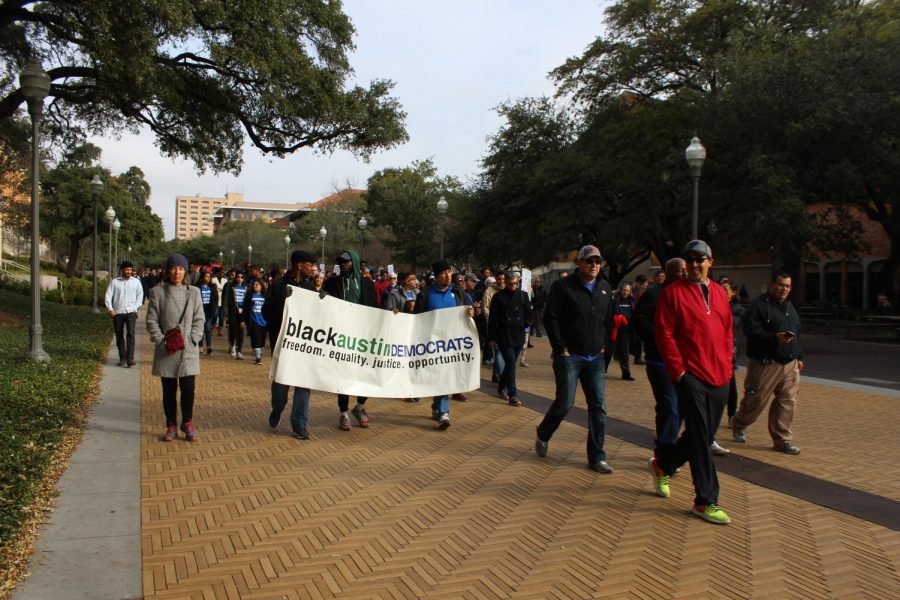Austin celebrates and honors Martin Luther King Jr.’s legacy
Austinites March together from the University of Texas-Austin to Huston-Tillotson University for the annual Martin Luther King Jr. Day festival. Festivities include street venders, local band performances and speeches from the Austin community. photo by Megan Ramsey
February 19, 2019
People holding letters spelling “WE BELIEVE” led Austinites in a march downtown on Martin Luther King Jr. Day. Prior to the march, celebrators gathered together around Reverend Dr. Martin Luther King Jr.’s (MLK) statue. Speeches were made calling out racism and inequalities, and hoping for a more united future. Everyone there came out to remember Dr. King’s legacy and lasting impact.
Martin Luther King Jr. Day was celebrated on Jan. 21. The march started at the University of Texas at Austin, where both leaders and members of the city community spoke. It ended with a festival at Huston-Tillotson University. Attendees enjoyed a variety of food vendors and music from several bands.
Darrell Collins, an annual participant of the event, said going to the march provides him with the opportunity to show his awareness about Dr. King’s legacy.
“He believed that everybody was equal, and so it’s imperative that we all still believe that,” Collins said. “Dr. King would not be happy with a lot of things that are happening right now, you know, because of the things that he lived and died for.”
Academic Counselor Ashley Rios shared similar sentiments to Collins. She said the march is a great place to remember Dr. King and that the U.S. still has more progress to make with civil rights. Rios said people have to recognize how everything in history has affected and lead to where we are now.
“I think we should always celebrate what MLK has done, despite the political climate,” Rios said. “We have to remember, sometimes it can be a product of our system, how this country was founded and how it still has a ripple effect to this day.”
Senior and president of Blatino club Maya Ferede encouraged people to go to the march. She said that the march is a good way for students to advocate for their interests, especially for children and teenagers who cannot yet vote.
“I’d say that we need another MLK like figure, but that’s not the most important part to create change,” Ferede said. “It’s nice for everyone to band together behind one person, but in order for there to be change and for it to continue is for people to take their fate in their own hands and advocate for what they believe in.”
Rios said people should be starting conversations with an open mind in order to talk about history without forcing beliefs on someone. She also said she encourages students to plan future LASA events in order to start discourses by inviting speakers or creating a seminars for Martin Luther King Jr. Day next year.
“Whatever you’re passionate about, talk about it. It doesn’t have to be about MLK,” Rios said. “But I think everyone has their things that they’re really passionate about, and they can focus on that if they want to.”
Collins said it is important to acknowledge what the U.S. is going through right now and what the U.S. has been through previously.
“I believe we’re all figures like Dr. King,” Collins said. “When you look in the mirror in the morning, you should be that one that’s a sojourner for truth, and if you have to look to somebody else to lead you all the time, you need to refocus on what’s going on in your life.”


